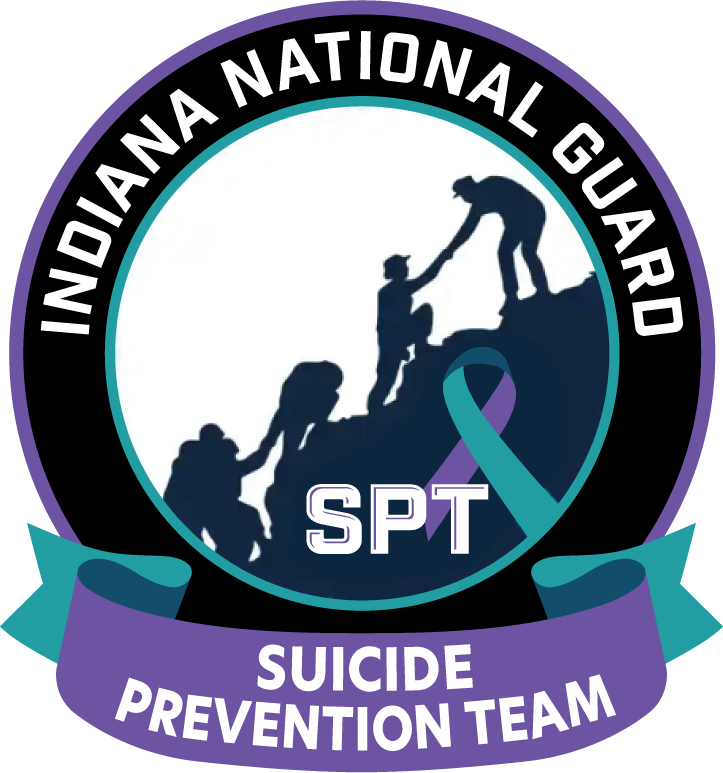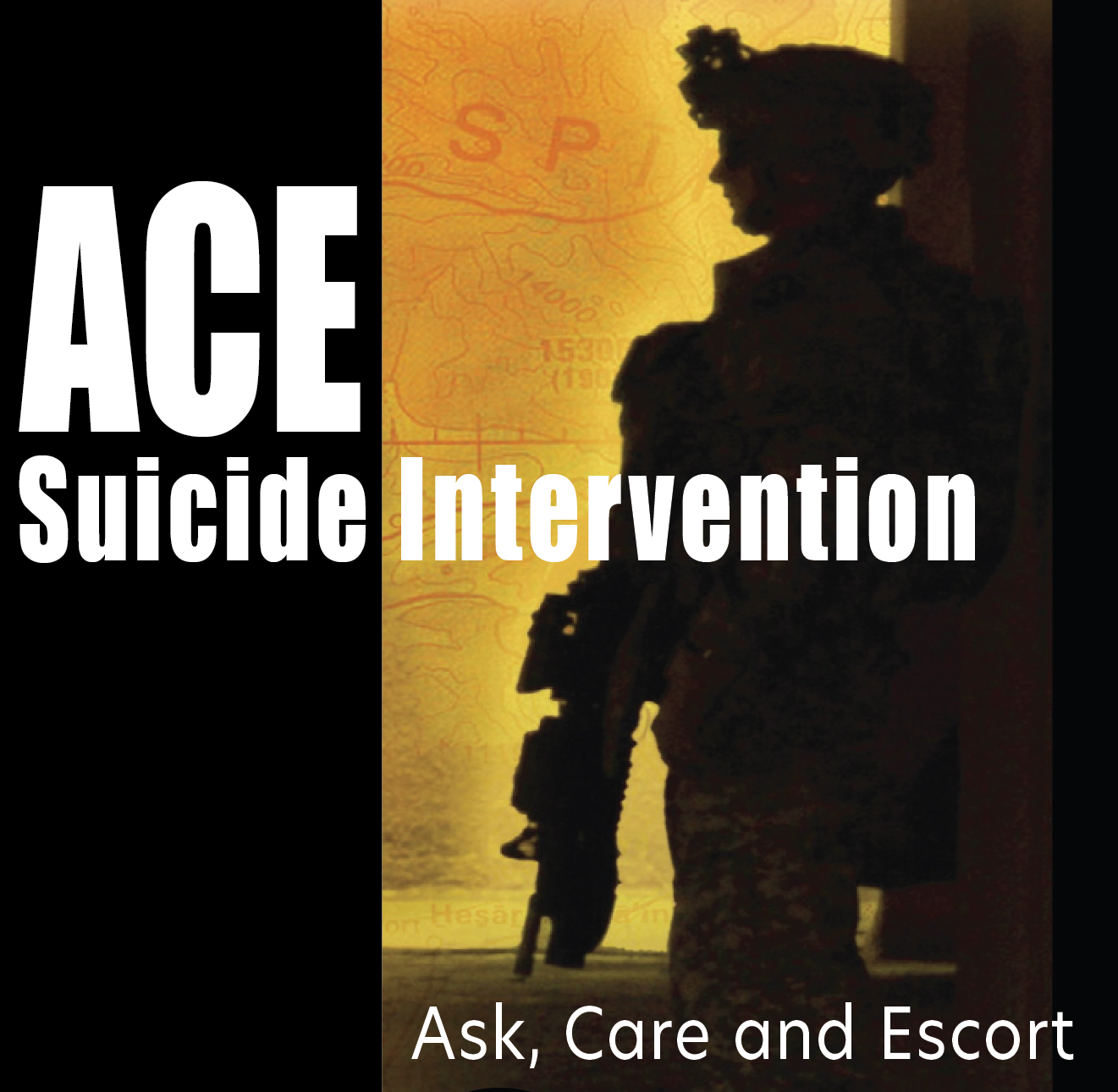Suicide Prevention
Sign up for Disc Golf Tournament - Hosted at Cyclone Fury Golf Course
THE VETERANS CRISIS LINE PROVIDES 24/7 CONFIDENTIAL CRISIS SUPPORT
FOR SERVICE MEMBERS AND THEIR LOVED ONES
If you or someone you know is currently experiencing thoughts of suicide, emotional distress or a mental health or substance use crisis, please CALL 988 + 1, TEXT 838255 or CHAT to speak with a trained crisis specialist 24/7. If your emergency situation requires immediate assistance from the police, fire department or ambulance/medical personnel, CALL 911.

The Indiana National Guard’s Suicide Prevention Team provides resources and education to all Guardsmen, family members and civilian employees to combat high risk behaviors. Our goal is a healthy organization that is resilient and knowledgeable regarding high-risk behaviors, educated on stress reduction measures and aware of available resources.
Learn More About Suicide Prevention
- Stigma of Mental Health
- Seeking Care - What to Expect
- Protective Factors
- Risk Factors
- Warning Signs
- Guardsmen In-Person Training
- Training Materials
The stigma of mental health in the military is grounded in the cultural misperception that a service member must have no physical or mental health issues to be mission ready. This stigma may extend to career concerns, confidentiality, and the perception and acceptance of mental health care.
Eliminating this stigma starts with the individual, their immediate network of family, friends and colleagues and the broader community understanding that mental health is a vital component of overall health. Just as you would see your dentist to maintain good oral health, or a cardiologist to maintain optimal heart health, seeking treatment for mental health concerns will help keep you in check to ensure you live a healthy, productive life.
Service members worry they will not be able to deploy, they will get separated out of the military, or that their unit leaders will find out about their diagnosis and perceive them as weak and make fun of them. Although occasionally those things happen, in general, we found that service members’ perceptions of these barriers are not accurate.
Firearms
Your firearm will not be “taken” if you report a mental health concern and no “flag” for mental health exists. A temporary profile will be written if you are diagnosed with a mental health disorder and are not yet stable but will be expired once you seek treatment and your provider states that you are stable. If you are experiencing suicidal thoughts, have attempted to end your life or have experienced a psychotic episode, a firearm restriction will be added to the profile but will expire once you seek help for the crisis and your provider states that you are stable.
Medications
If you are prescribed an antidepressant or an antianxiety medication, you simply need to return a medication stability letter after 90 days so we can send the medication with you when you deploy. Some medications are not allowed to be taken long-term such as benzodiazepines (Xanax, Valium, Klonopin), sleep medications (Ambien, etc.), and antipsychotic medications prescribed for a psychotic disorder, but most mental health medications are allowed to be taken in the military.
Counseling
You will be encouraged to go to various types of counseling for the specific area of concern (grief, marital, individual or group counseling) so you can work on improving your quality of life and lessening your risk factors for self-harm. Getting help for a mental health disorder is a sign of strength and can help you be mission ready.
Resources
Be sure to take advantage of the many resources available to you as a service member, Guardsman or family member. Call your behavioral health officer, call your chaplain, find a counselor on MilitaryOne Source if you do not have insurance, find a counselor who takes your insurance if you have it, call your primary care doctor, or call 988 + 1 if you are in a crisis.
Protective factors are circumstances in people’s lives that help us deal with stressful events and protect against suicide risk.
These can include:
- Reasons for living such as a significant other, children, pets, etc.
- Quality health care (physical and mental)
- Effective coping and problem-solving skills
- Cultural, religious, or moral objections to suicide
- Reduced access to lethal means
- Sense of belonging
More information about protective factors: Centers for Disease Control
Risk factors are characteristics or conditions that increase the chance that a person may try to take their life.
These can include:
- Failed Relationships
- Family history of suicide
- Prior suicide attempt
- Poor social skills
- Access to lethal means
- Financial Struggles
- Unemployment
- Alcohol and drug abuse
- Legal Problems
- Mood disorders
More information about risk factors: Centers for Disease Control
If someone is at risk for suicide, you can watch for warning signs, including:
- Talking about being a burden
- Being isolated
- Increased anxiety
- Talking about feeling trapped or in unbearable pain
- Increased substance use
- Looking for a way to access lethal means
- Increased anger or rage
- Extreme mood swings
- Expressing hopelessness
- Sleeping too little or too much
- Talking or posting about wanting to die
- Making plans for suicide
- Risk taking behavior
More information about warning signs: Centers for Disease Control
Ask, Care, Escort-Suicide Intervention (ACE-SI) training is a gatekeeper training meant to reinforce key suicide intervention concepts in military leaders who hold positions of trust in order to encourage subordinate trust and help-seeking behavior. ACE-SI training assists leaders in identifying service members at risk for suicide so they can intervene and connect them to the appropriate resources.
- ACE-SI (8-hour course)
- ACE-SI T4T (train the trainer, 16 hours, 2 days)
Contact us to request training:
- Suicide Prevention Coordinator, 317-247-3300, Ext. 64330
- Resilience, Risk Reduction, and Suicide Prevention (R3SP) Specialist 317-247-3114 or 317-247-3300, Ext. 64329
Suicide Intervention – How You Can Help
Now and then someone notices that a fellow service member, co-worker or friend who's usually upbeat and ready for a laugh is lately much quieter than usual, maybe even withdrawn and downcast. That, and certain other things can be a sign that the person is suicidal, and suicide prevention experts say everyone should be ready to spot the signs and take three key steps to help save that troubled person's life. These three steps make up the Army's "ACE" suicide prevention model: Ask, Care, Escort.
–Adapted from “Taking three simple steps, Ask-Care-Escort, can help save someone from brink of suicide,” by Franklin Fisher, Fort Moore Public Affairs Office, Sept. 24, 2020. Read more
ASK
There are behaviors that may be signs a service member needs support. Know how to ask the most important question of all:
- “Are you thinking of killing yourself?”
- “Are you thinking of suicide?”
- “Have you had thoughts about taking your own life?”
Be direct! When asking the question, remember:
- DO ask the question if you’ve identified warning signs or symptoms.
- DO ask the question in such a way that is natural and flows with the conversation.
- DO NOT ask the question as though you are looking for a “no” answer (example, “You’re not thinking of killing yourself, are you?”).
- DO NOT wait to ask the question until they are halfway out the door.
CARE
- Listen and express empathy
- Be genuine
- Let them do the talking
- Actively listen to show support
- Do not minimize their problems
- Set accurate expectations
As you listen, ask them to do the talking, and use supportive, encouraging comments. Use the following steps to let the service member know that you are listening and acknowledge their experience:
- Talk openly about suicide be willing to listen and allow the service member to express their feelings.
- Recognize the situation is serious.
- Do not pass judgement.
- Reassure them that help is available.
ESCORT
If a service member is having suicidal thoughts, remain calm and reassure them that help is available:
- DO NOT keep the service member’s suicidal behavior a secret.
- DO NOT leave the service member alone.
- Try to get the person to seek immediate help from his or her doctor or the nearest hospital or emergency room.
- Call 911
- You can also call the confidential 24/7 Veterans Crisis Line: Dial 988 Press 1.
Lethal Means Safety
Lethal Means are methods used in a suicide attempt. Research has shown that a suicide attempt can occur within 5-10 minutes from idea to action, so putting time and distance between an at-risk individual and a means of suicide is an effective way to prevent suicide death.
Safeguarding lethal means is the practice of safely storing medications, firearms, and other methods used for self-harm, making these methods less available and less likely to cause death in a suicide attempt. When someone is at risk for suicide, making lethal means more difficult to access can save that person’s life!
Download the U.S. Army Resilience Directorate’s Lethal Means Fact Sheet
Prepare your home to safeguard lethal means:
- Remove ammunition from the home
- Remove firing pin or key parts of weapons
- Lock up weapons, medications or other lethal means, and give someone else the key or combination
Whether you are at risk, or you know someone who could use support, it is worth the time to create a safety plan. A safety plan is a step-by-step list of coping strategies to help service members navigate a crisis. If you are experiencing a suicidal crisis, reach out to a clinician for a suicide risk assessment and work with your clinician to create your safety plan.
A safety plan includes 6 steps:
- Warning signs How will you know when your safety plan should be used? What are your signs of a crisis?
- Internal coping strategies What are things you can do to distract yourself from a crisis without contacting others?
- Social contacts to distract from crisis Write down the names and phone numbers of three people or places that provide healthy distractions.
- Family members or friends who can offer help Write down the names and phone numbers of four people you can call for help.
- Professionals and agencies to contact for help Write down the names and phone numbers for four professionals and agencies that can help you in a crisis. These may include the Veterans Crisis Line, your doctor or a local emergency department.
- Making the environment safe Write your plan for limiting access to lethal means, or for removing lethal means from your environment.
Get Started: Download the VA Safety Planning Worksheet
The Indiana National Guard provides free safety items for Guardsmen who would like to safeguard lethal means for themselves or someone else. These items include gun locks, medication bags and pill boxes. Please complete the form below to request these items:
Contact Us
Indiana Army National Guard
Suicide Prevention Program Manager
317-474-5240
Behavioral Health Resource Line
M-F, 7:30 - 4 p.m.
317-247-3155
State Resilience Coordinator
317-247-3300, Ext. 64329
Chaplain
317-247-3300, Ext. 73466 or 63005
Soldier & Family Readiness Lead
1-800-237-2850, Ext.72694
ng.in.inarng.mbx.indianasfrc@army.mil
Indiana Air National Guard
181st Intelligence Wing
DPH: 812-877-5726
Chaplain: 812-877-5192
122nd Fighter Wing
DPH: 260-478-3733
Chaplain: 260-478-3315
Emergency and Non-Emergency
IN AN EMERGENCY
CALL the Veterans Crisis Line: 988 + 1
Or TEXT: 988
Non-Emergency Resources
Community Resources
- Defense Centers of Excellence for Psychological Health and Traumatic Brain Injury
- Give an Hour
- Indiana Family and Social Services Administration (FSSA) Addiction
- Indianapolis Vet Center
- Military OneSource Joint Services Support
- National Guard Suicide Prevention Resources
- Psychological Health Resource Center
Military Department of Indiana | Indiana National Guard







